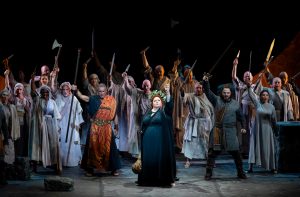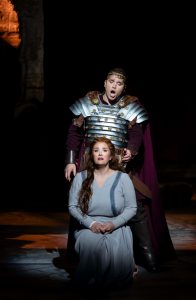
By Márcio Bezerra
Few operas in the repertoire can claim the same legendary status as Vincenzo Bellini’s Norma. Be it because it can be considered as the masterwork of bel canto, or because all the great divas of the past have tackled the title role with memorable results, Norma sets the standard for what a great soprano should sound like.
In general, bel canto operas are (in)famous for their convoluted plots and less-than-stellar dramatic pace, since composers placed the beauty of the singing line above everything else. In Norma, fortunately, one could defend the librettist (Felice Romani) for having provided a dramatic plot in which love, religion, and patriotism collide with each other, all dressed in superbly beautiful music.
One can only imagine the desperation of the staff of Palm Beach Opera when they heard, right before opening night, that the scheduled Jessica Pratt had to cancel her PBO debut in the title role due to an illness. Fortunately, what they got was no understudy, but Angela Meade, a distinguished Norma herself, with appearances on the role in many top opera houses, including the Metropolitan Opera.
One of the great qualities of Palm Beach Opera is the homogeneity of its casts. Usually, nobody is so much better or worse than the others that they can become a dramatic distraction. With a superstar like Meade on the roster, that could be a problem, but the two other female roles were sung superbly, closing the season on a high note (more on that later).
Using sets and costumes from Cincinnati Opera, the production’s set remained the same throughout the two acts, but, thanks to the superb lighting work of designer Mary Shabatura, there was no feeling of visual boredom on the stage.
The ever-reliable Palm Beach Opera Orchestra, led by guest conductor Carlo Montanaro, sounded particularly precise. The string section’s intonation and articulation were standouts. The chorus had clear diction and a nice, homogenous tone.

As noted above, female voices were consistently excellent. The same could not be said about their male counterparts. As the leading tenor, Paolo Fanale displayed a beautiful tone and ease of reaching high notes. He started strongly in “Meco all’altar di Venere” only to sound tentative in the cabaletta “Me protegge, me difende.” Although he sounded better as the opera progressed, there was not enough power in his singing and his diction was (surprisingly, for an Italian) less than clear at times.
Bass-baritone Nicolas Testé fared better as Oroveso, singing with authority and good stage presence.
But one comes to Norma for the two female roles. As Adalgisa, mezzo Ashley Dixon was noteworthy for her acting skills and for matching her tone to Meade’s during the duets the tragic pair shared in the opera.
Another highlight was Maria Vasilevskaya’s Clotilde. She imbued her short interactions with Norma with dramatic skill and a gorgeous tone. Clearly, a singer to watch.
To talk about Angela Meade’s Norma at Palm Beach Opera would require so many superlatives, that the review would become unreadable. Her characterization of the steely priestess had authority and a sense of drama that was convincing. Even though her “Casta diva” was by all means a first-rate rendition, her singing evolved even more as the opera progressed, treating the audience to a world-class performance that one will remember for a long time.
This was a thrilling closing to the 2024 opera season. May 2025 bring us even more superb singing.
***
The 2024-25 season at Palm Beach Opera will consist of Gounod’s Romeo et Juliette, Verdi’s La traviata and Mozart’s Le Nozze di Figaro.